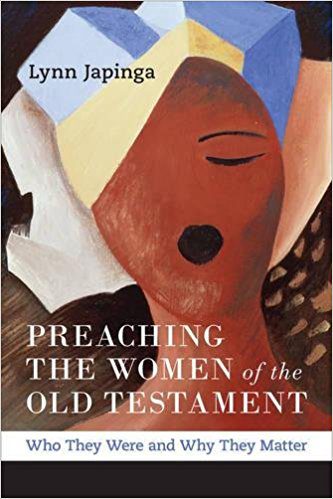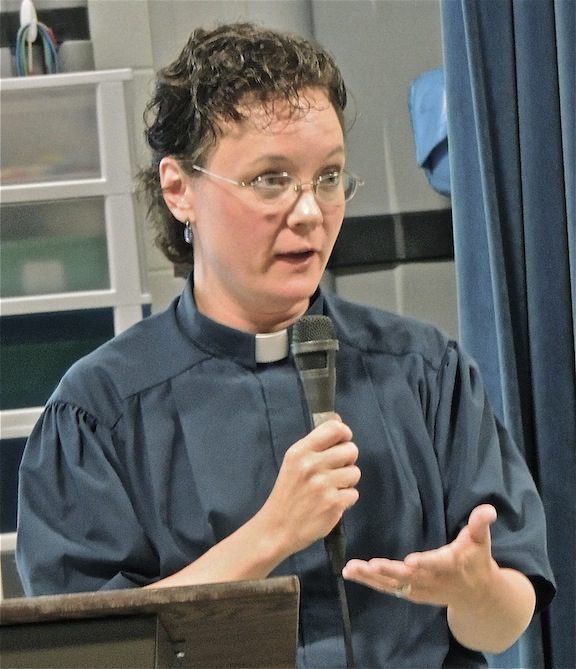Preaching the Women of the Old Testament: Who They Were and Why They Matter. By Lynn Japinga. Louisville, KY: Westminster John Knox Press, 2017. 221 pages.

This book is a gift to the church
Lynn Japinga has given the church a tremendous gift in this book that covers 40 women of the Old Testament with equal measures of insight, wit, and grace. She has a talent for unearthing the hidden treasures of women’s stories, asking just the right questions of the biblical texts, and either rehabilitating or restoring the names of these women. In the process, she helps us discover important things about ourselves and our faith as well.
Japinga is Professor of Religion at Hope College in Holland, Michigan, and an ordained minister in the Reformed Church in America. She explains that many of us think we know the stories told about these women of the Old Testament, bu it turns out that many are either slanted, or outright untrue:
“When interpreters misread the story of Eve and blamed women for sin, they contributed to centuries of sexism, leading society to view women as inferior and dangerous. When commentators criticize a biblical woman like Miriam for speaking out or taking initiative, their words have a chilling effect on contemporary women readers. The stories we tell ourselves about the Bible have extraordinary power, but they are not always correct,” (4).
Japinga’s goal, then, is to “fill the gap” in our knowledge and correct the generalizations that have been so destructive.
Women as fully human
Each short, digestible chapter begins with a summary of the woman’s story, along with commentary from previous scholars’ interpretations. It is disheartening to see respected scholars ranging from Calvin and Luther to Kuyper and (surprisingly) Brueggemann disparage or just dismiss some of the women. But Japinga fearlessly counters with a much more nuanced treatment that includes the historical Sitz im Leben that partly shaped the women’s behavior, for good or for ill. This allows us to see them as fully human, rather than ciphers, caricatures, or non-entities.
“How did I never hear about her?”
Preaching the Women of the Old Testament could easily be used for Bible study among clergy or with laity. Each chapter lists where the figure is found in scripture and notes whether or not her story is included in the Revised Common Lectionary. Given the fact that more than half of them are not included, it will be no surprise to hear folks exclaim, “I’ve never heard of her before!” This is exactly why this book is so important. We need to know the names of Tamar, Achsah, and the Daughters of Zelophehad, and what their rarely told stories can teach us about faith, justice, and bravery in the face of oppression.
An indispensable resource for preachers
Preachers will find this to be an indispensable resource when it comes to seeking a fresh perspective not just on women of the Old Testament, but also the men whose stories so often overshadow their wives, concubines, daughters, sisters, and victims. Japinga provides a clear-eyed and well-written account of these women’s stories that will help the preacher find a different angle for the well-known narratives, as well as flesh out other stories in which women play a seemingly minor role. The appendix contains a helpful list of suggestions for different sermon series, as well as a scripture reference index.
How to deal with “toxic” stories
While Japinga never shies away from pointing out the toxic aspects of certain stories (such as Dinah, Gomer, and the Levite’s Concubine), she skillfully and pastorally directs us to consider what these painful stories can teach us about how not to treat women and girls – or any human beings, for that matter. For example, the story of the rape of Tamar in 2 Samuel “ends badly. She is desolate. David is silent. Amnon is dead. This is not an ending to imitate.” However, Japinga notes that while there is no good news here, “the text invites and encourages us to write a different ending to the story, where the parent takes action, the abuser is confronted, and the victim is heard and cared for,” (135).
This invitation to “write a better ending” encourages readers of the Bible to see the text not as a closed and tragic story. Instead, scripture can be viewed a means by which to imagine how justice and mercy might be drawing us to God’s purposes, especially in light of the abuse and downright cruelty of the characters in this dysfunctional drama.
Naughty girls need love, too!
When it comes to the “bad girls” of the Hebrew scriptures, such as Eve, Delilah, and Jezebel, Japinga reminds us of the double standards of morality applied to women versus men, and always manages to find something redeeming about their character. Jezebel, for example, would have been seen by her people as “a devoted wife and mother, deeply committed to her religious faith,” (143). Similarly, the Philistines would have viewed Delilah as a hero who sought the welfare of her country. By helping us understand other perspectives about these women, Japinga models what it looks like to proclaim God’s liberating grace – even if the best we can do is to be honest about both our flaws and our gifts, trusting God to work in and through the best and worst we have to offer.
Preaching the women of the New Testament?
I hope that Japinga is working on a companion volume for preaching the women of the New Testament. I would look forward to her treatment of everyone from “bad girl” Herodias, to the slave girl released from her fortune-telling demon in Acts. More treasures await!
An abridged version of this review will be published in an upcoming edition of the journal Encounter, published by Christian Theological Seminary.
 Leah D. Schade is the Assistant Professor of Preaching and Worship at Lexington Theological Seminary (Kentucky) and author of the book Creation-Crisis Preaching: Ecology, Theology, and the Pulpit (Chalice Press, 2015).
Leah D. Schade is the Assistant Professor of Preaching and Worship at Lexington Theological Seminary (Kentucky) and author of the book Creation-Crisis Preaching: Ecology, Theology, and the Pulpit (Chalice Press, 2015).
You can follow Leah on Twitter at @LeahSchade, and on Facebook at https://www.facebook.com/LeahDSchade/.
More of Leah’s book reviews:
Eco-Reformation – Grace and Hope for a Planet in Peril
Dar Tellum: 1970s Children’s Book about Climate Change
For more of Leah’s posts on women and religion, feminism, and gender, check out these links:
Top 10 Things Never to Say to Your Female Pastor
#MeToo, #ChurchToo: The Church is Facing the Truth About Its Sexism
7 Ways Your Church Can Support Your Female Pastor
Words of Advice for Good Men: #MeToo Meet #YouToo
Jesus, Mother Hen: This is the God I Want to Worship

















